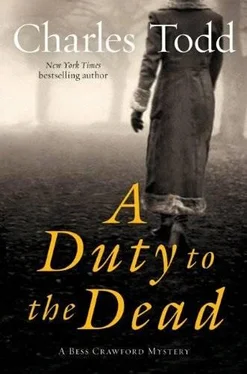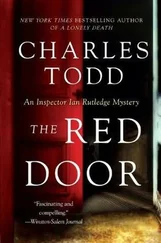“I killed her. Of course I did. When the police showed me my knife, I told them the truth. Do you think I’d have lived nearly fourteen years in that godforsaken asylum if I wasn’t sure what I’d done?”
The admission was shocking.
“But you just said-you haven’t come to London to remember, you already have-” If I hadn’t been afraid before, I was now.
“You aren’t listening. I want to remember why I wanted to kill her. Why I picked up that knife, and when. And how it felt to do what I did that night. I’ve shut it out, it’s all missing, and when I was so ill, when I thought I was dying, I realized that I had to know. I had to put it all together and look at it in the light.”
His eyes were intense, and I wondered if I would live through his nightmare. Or since he knew what murder felt like, whether he would be eager to experience it again. I’d read somewhere that when men kill, as in wars, they lose a little of their humanity each time until it becomes easier, less awful, and they accept killing in a way that civilized people can’t tolerate. Whether it was true or not, I didn’t know. But in front of me was a man who had killed not in war but on a quiet London street, without provocation or, as far as I could see, a drop of repentance.
Peregrine Graham must be as dangerous as his family claimed-it would behoove me to be very careful, or I could trigger his anger and suffer the consequences.
A part of my mind said, They should have hanged him when they had the chance…
I asked, clearing away the tea things in an effort to keep my hands from shaking, “Peregrine. What good will it do to remember? What will you have gained, bringing it all back again?”
“I can heal.”
It was such an unexpected answer that I stared at him.
“You don’t know what it’s like to look in the mirror every time you shave and see a normal face when you know that beneath the flesh and bone there’s a monster inside. I told myself there in the bed in Owlhurst that if God forced me to live, I’d find a way to force myself to face myself.”
I caught my breath. It was all so logical. And so macabre I didn’t know how to respond.
He smiled crookedly. “This is a poor recompense for saving my life. But then I didn’t want it to be saved.” He reached into his pocket and pulled out the crumpled envelope from Elayne’s letter. “You gave me the means. Unwittingly.”
I wanted nothing more than to turn back the clock, arrive on my doorstep and find the flat empty-or filled with my friends and their friends, all of them real, all of them normal.
I was allowed to go and do the marketing, a little later in the morning. I was reminded that Mrs. Hennessey would suffer if I talked to anyone, or sent a telegram to Kent. She was there at her door when I came back, smiling at me, asking how my arm was faring, and if I’d come to London to take up my next posting.
I answered her questions, smiling as if nothing had happened to change my world or hers. I told her that I’d been in Kent and had returned to London to spend a little time with friends, that I had missed them, shut away in Somerset.
She nodded and told me that I had only to ask, and she would bring me anything I needed.
I thanked her and went on up the stairs, feeling Peregrine in the darkness at the top, watching and listening. He had the door open for me, and then shut it behind me. “That was well done.”
Ten minutes later, he was asking me how to go about finding a particular house in London.
“You don’t remember where you were staying?” I asked, surprised.
“You don’t understand. I was never told these things. I was taken to the train, I was taken to the house, and I never left it until we returned to Kent. I can only tell you what I saw from my window-a fenced square with trees, a walk, several benches, and a gate on four sides. The house across from ours was a pale cream, with six chimneys, a false balcony on the upper floors-no more than an ornate iron railing in front of the windows-and a black door with a brass knocker and short iron railings up the two steps to the door.”
“There are any number of houses in London that match that description.”
I debated how far I should go in helping him, whether dragging my heels would wear him down or if helping him would buy some protection in the end.
“Then we’ll walk the streets until we find the right one.”
“You aren’t in any condition to walk the streets. This is winter, and London is damp, cold. You could find yourself ill again. Pneumonia can come back.”
“It behooves you to help me. The sooner the better.”
I made up my mind. “I’ll take you to a place I know that fits your description. It may be the wrong place. But it’s somewhere to start.”
“Fair enough.”
I had bought a razor for him while I was out, and he used it, ridding himself of the dark beard and, with it, some of the sinister expression that I hadn’t seen while nursing him. I’d kept him reasonably well shaven then because of the need to wash his face after his fearsome coughing fits.
We left the flat together. I expected-dreaded-Mrs. Hennessey popping out her door and asking who my young man was.
An escaped murderer, Mrs. Hennessey. My father will be horrified.
But she didn’t come out her door, and then we were in the street.
London in winter is cold. The damp from the Thames pervades the city, and the wind seems to sweep down the long streets without hindrance, as if blowing across Arctic ice floes. A bitter and penetrating cold, the sort that makes life miserable for those who live here.
We found a cab in the next street, and I gave the driver the only address I could think of, the one that Mrs. Clayton had mentioned in her enthusiastic account of nearly visiting London. But would Peregrine know it now? Would he recognize the square or the houses?
We said very little to each other-from the time we left my flat, our conversation had been limited to necessities. I could feel his presence beside me, determined, and surely dangerous if crossed.
We got down by Carroll Square. In the center of it, the garden was winter bleak, trees that blossomed in spring showing bare branches to the steel gray sky, and the earth of flower beds looking like the burrows of fat, invisible animals. I began to walk along the street, looking up at the houses as we passed.
I could see Number 17 now, across from the southern gate into the square. It was a handsome house, white with black shutters, and there were two small evergreens in pots on either side of the black door. I looked across to the other side of the square. Number 17 was almost a mirror image of the house directly opposite, across the garden. In place of the ornamental pots, there were decorative mock wrought-iron balconies at the first-floor windows and railings at the shallow steps to the door.
I didn’t draw attention to either house but watched Peregrine as he gazed from one to the next. Let any flicker of memory be his and not a reflection of my knowledge. But I thought perhaps this was where the murder had occurred, and wondered what might be stirring in Peregrine’s mind.
Peregrine looked about him with a frown on his face. “The trees in the square are different-”
“It was probably early autumn, when the trees were in leaf.”
“Yes. Of course.”
There was no one about at the moment, and we had the street to ourselves.
We strolled around the square as he sought to find something familiar.
“I don’t think this is the right place,” he murmured to himself. And then as we went around for a second time, he said, “I should be in an upstairs bedroom looking out. At this level, nothing is the same…”
“I don’t think we would be welcomed-”
Читать дальше












